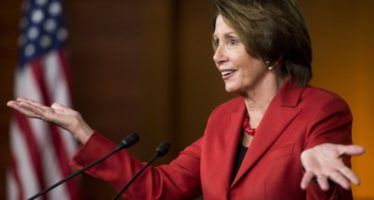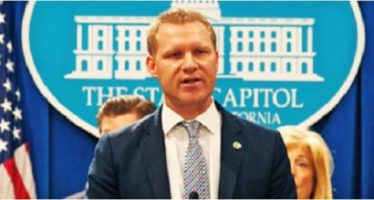'Ideal' State Budget Forecast
JAN. 14, 2011
By KATY GRIMES
On Thursday the Senate and Assembly Budget Committees got a dose of happy budget talk, and a hopeful economic prognosis, from the state’s Finance Department. But not everyone was buying the rosy outlook.
Newly appointed Department of Finance chief deputy director Michael Cohen appeared before the committees, along with Legislative Analyst Mac Taylor, to discuss Gov. Jerry Brown’s proposed budget, released earlier this week. Cohen gave an overview of Brown’s proposed cuts as well as “revenue” sources, including continuing tax increases for another five years.
Assemblywomen Diane Harkey, R-Dana Point, got right to the point, asking Cohen what will happen when the five-year tax extension expires.
“What we need to do is adopt the governor’s budget, which solves the state’s long term problems,” he said. “And by that time, ideally, our economy would be in good shape.”
Solves the long-term problems? Harkey found this especially interesting. “This is a proposed workout plan because we have failed to address the ongoing budget crisis,” she said. “One point seven billion is shifted from the redevelopment fund to welfare and trial courts — how is that a reduction to the state?”
Cohen said he expected “counties to be fully funded after five years,” but offered few specifics.
“We have a cash flow crunch,” Harkey continued. “If we were a private company, we’d be in bankruptcy.” Then Harkey asked about a budget report showing $1.2 billion going to the California Teachers retirement program, but “no accounting at all of CalPERS,” the public employee retirement system. “Shouldn’t that be a part of the proposal?” she asked. “We have to take money from cash flow as we back fill, trying to keep these funded?”
Cohen was again was optimistic, but short on details. “If the governor’s budget is adopted, our cash flow will come back in line,” he said. “We’ll be in good shape… We can’t do everything right now. We need to get long term budget priorities fixed, but just not in the next couple of months.”
Assemblyman Roger Dickinson, D-Sacramento, a long-time Sacramento County supervisor, seemed concerned about the “realignment” shifts from the state budget to local governments. “There needs to be much more thought to what happens after five years than some sort of general assurance,” said Dickinson. “We can all dig into our pockets a little more.”
It was much the same thing over in the Senate. Sen. Mark Leno, D-San Francisco, asked several questions to Cohen and Taylor, indicating that Democrats seem to be preparing for cuts to services along with a push for the continued tax increases.
Discussing whether the proposed tax increase extensions are passed or not in the June election, Leno said that kindergarten-through-twelfth grade education funding, as well as public safety, would suffer.
Cohen covered the many areas that Brown’s budget proposes to cut, including community colleges, child care, some social service subsidies, as well as pay decreases to state employees not covered by collective bargaining agreements. But Cohen assured legislators, “We want to get all of our state employees under contract.”
Sen Bob Huff, R-Diamond Bar, wanted to know what cuts will take place as state programs are shifted to counties and other local governments.
This seemed to make Cohen uncomfortable. “There are… not immediate cuts, but a loss of service, yes,” he said.
“What happens when the taxes fail in June?” asked Huff, “because they will fail. Will there be a June revise?”
Cohen told Huff that he was asking a strategic question. “I don’t know how to walk that line,” he answered.
Sen. Alan Lowenthal, D-Long Beach, was concerned about the future of affordable housing because of cuts to redevelopment agencies. “Who is going to provide affordable housing in the state?” he asked. “We did it to reduce blight and increase affordable housing. I’ve been a leader in talking about this.”
But not all of the Democratic legislators defended the cuts. Newly elected Sen. Michael Rubio, D-Bakersfield, offered suggestions for additional cuts and savings. “You know the mobile MRI units for prisoners?” he asked. “Our veterans have to travel, sometimes over the Grapevine, to get MRI’s. Why don’t we sell these for military veterans? We have a credibility problem. Shifting Prop 10 money will cut one program to fund another, and strip the flexibility as well.”
In a nearby office, reminding Republican lawmakers not to acquiesce to the tax increases, Jon Coupal, president of the Howard Jarvis Taxpayers Association, held a press conference, flanked by more than 80 anti-tax advocates, and promised a taxpayer grass-roots campaign to keep the tax increase proposal from making it onto the June ballot. And if it does, they promised to to defeat it.
“We scheduled this conference knowing that the same cast of characters were going to try to pull what they pulled before,” said Coupal. “And that is to raise our taxes.”
He and the anti-tax supporters promised relentless advocacy and a lack of forgiveness of any Republicans who might stray from their pledged opposition to tax increases.
Related Articles
Nancy Pelosi will vote for legal pot
Although former House Speaker Nancy Pelosi, D-San Francisco, waited until the last minute, she sent an unequivocal message to
State watchdog agency points to flaws in bond oversight
SACRAMENTO – The Oroville Dam’s near disaster has ignited a long-overdue debate about the condition of California’s infrastructure, and the
Assembly Republicans: Hold steady in 2016 to build for 2017
Facing a presidential election that’s guaranteed to overshadow them and numbering so few that passing even a simple resolution requires




